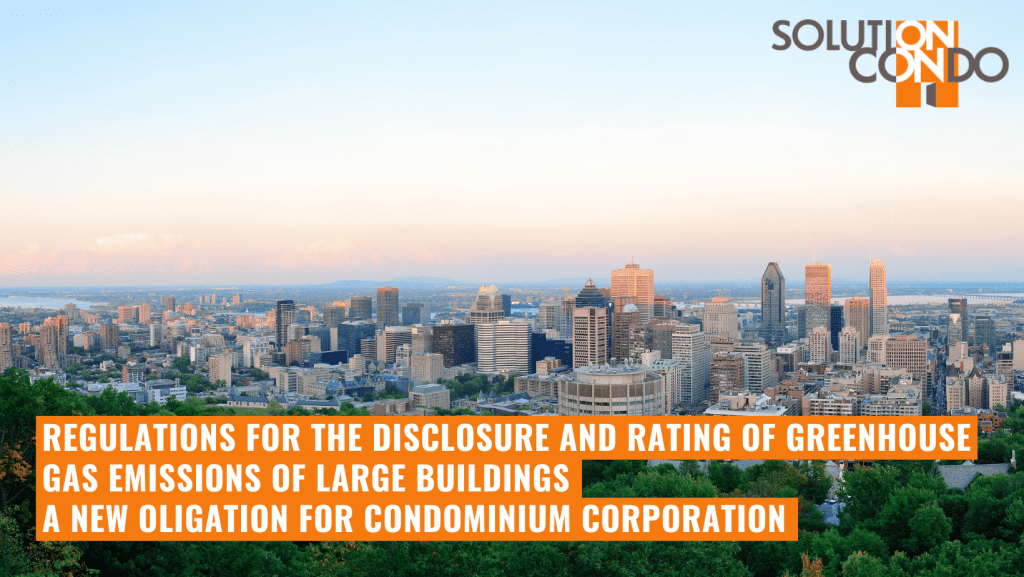



A new regulation has been added to the workload of Condominium Corporation and Managers, and while the goal is laudable (Montreal aims to become carbon neutral by 2050), it brings a new set of challenges for compliance, with a first deadline of June 30 for buildings with more than 50 units.
This by-law applies only to the City of Montreal and its boroughs. The other cities making up the agglomeration are not subject to it.
To become carbon neutral by 2050, the City of Montreal, on September 27, 2021, adopted the By-law concerning greenhouse gas emission disclosures and ratings of large buildings (21-042). Its aim is to identify the use of fossil fuels within buildings in order to reduce their consumption.
It therefore gradually requires owners of large buildings to disclose the sources and quantities of energy their buildings use and has introduced a mandatory procedure for disclosing data regarding GHG emissions generated by building energy consumption.
This applies to multi-unit buildings, including co-ownerships.
On June 30, 2023, buildings from 5,000 m2 to 14,999 m2 and 50 or more dwellings must disclose their 2022 data.
(On June 30, 2024, its buildings from 2,000 m2 to 5,000 m2 and 25 to 49 dwelling that will be added and need to disclose their 2023 data).
The owner of a building subject to this By-law must, no later than June 30 of each year (and for the first time in June 2023 or June 2024), disclose to the City of Montreal information regarding its energy data for the period from January 1 to December 31 of the previous year. The data to be disclosed for buildings are monthly energy quantities by source (electricity, gas, other) and certain building characterization data, including surface areas in m2 and use.
Article 4 of this new mandatory disclosure regulation stipulates that: “The owner of a building subject to this by-law must, no later than June 30 of each year, disclose to the authority having jurisdiction the information set out in schedule A to this By-law relating to the building’s GHG emissions resulting from the building’s energy consumption during the period from January 1 to December 31 of the preceding year.”
Every year, owners will have to complete an online declaration, in which they will be required to disclose information on their building such as type and quantities of energy used and the surface area of the building.
The objective of this approach is to allow the City of Montreal, firstly, to evaluate the quantity of greenhouse gases (GHG) produced by these large buildings, and eventually to give them a “GHG rating”, for information purposes only, to be displayed at the buildings’ entrances.
The answer to this question is YES. Article 2 of the By-law explicitly defines the notion of owner as follows: “any natural or legal person, partnership or, in the case of a divided co-ownership, any Condominium Corporation of co-owners that holds all or part of the property rights in a building”.
The City was careful to specify Co-ownerships in its by-laws, because in divided Co-ownership the co-owners own their private portions exclusively, and jointly on their shares of common portions. The Condominium Corporation, on the other hand, owns nothing. It is created at the beginning of the Co-ownership to see to its administration and smooth running as a whole, through the decision-making bodies of the Condominium Corporation and the Co-owners’ assembly.
However, it is not easy for a third party such as a Condominium Corporation to obtain the information requested by the City, as a Condominium Corporation has no coercive powers to obtain energy consumption data from co-owners.
According to Condolégal, ” Even if a Condominium Corporation had such information, the Act respecting the protection of personal information in the private sector prohibits it from disclosing the personal information of co-owners without their consent”. It also specifies that “The City of Montreal has also recognized in its By-law Application Guide that the transmission of energy consumption data involves confidentiality issues. It is specified in particular as follows: « Agreements between landlords and tenants, or between condominiums, can be signed so that the aggregate consumption of the building can be transmitted directly and easily to the landlord (or the condominium corporation) by the energy supplier. The City of Montreal is currently in discussions with energy providers to develop a simple solution with no data privacy issues in the event that this type of agreement requires too much monitoring by the owners.”
It is therefore probably in view of the context of Condominium Corporation that the City is trying with Hydro-Québec and Énergir to create a gateway so that the information can more easily be communicated to the City. It seems that the gateways have been operational since the end of May 2023.
The information to be disclosed is specified in Schedule A of the City of Montreal By-law, and is as follows:
To comply with By-law 21-042, the City of Montreal explains in its website that there are two ways to provide building data:
1 – You can use the ENERGY STAR Portfolio Manager® portal tool (recommended by the City)
2 – or use the data entry tool of the City.
To do so, you must have a Google account to use the City’s data entry tool: Complete the form (2022)
The city of Montreal (Bureau de la transition écologique et de la résilience) has confirmed that the device mentioned for providing data anonymously was put in place by Hydro-Québec at the end of May:
“Automatic transfer and aggregation code of Hydro-Québec’s energy consumption to the Energy Star Portfolio Manager (ESPM) platform has been operational since May 25.” Here’s the page Hydro-Québec has posted to explain the process.
To allow Hydro-Québec to automatically communicate consumption data to the Energy Star Portfolio Manager (ESPM) tool, Co-owners must give their authorization and create an ESPM account.
Here’s how:
Precision from Hydro-Québec in case you are not entirely responsible for the electricity service:
If you are the owner of a building with rental spaces, or a Co-owner and co-responsible for the electricity service, or if you own a building with individual meters for which you are responsible for the electricity costs*, you must follow these instructions:
* This service is offered if the building has at least 10 meters associated with the same type of use (residential or commercial).
If you encounter any technical issues with the Energy Star Portfolio Manager tool, you can write at [email protected].
To summarize, here are the steps you need to follow to set up the automated transfer of your consumption data to ESPM:
|
Step 1 |
Authorize Hydro-Québec to communicate your data with ESPM |
|
Step 2 |
Create a profile for properties and meters in ESPM |
|
Step 3 |
Connect your ESPM account to Hydro-Québec web service |
|
Step 4 |
Activate the automated communication of your data to ESPM |
|
Step 5 |
Check if your requests are accepted |
Énergir also offers automatic data transfer to Energy Star Portfolio Manager (ESPM). Here’s the link to access all information on their site.
To activate the transfer of your consumption data (m3) between your ESPM account and your Énergir account automatically each month, you must complete the request to link your accounts directly from the Energy Star Portfolio Manager (ESPM) platform. Make sure you have your latest Énergir invoice.
If you wish to add your billing information ($) in your ESPM account, you must complete it manually. Log in to your Énergir Customer Space to access your invoices and find all your account information.
A user’s guide has just been published, and can be access in the customer area: https://energir.com/files/energir_common/import/Fichiers/Affaires/Tarif/Guide-creation-compte-ESPM_080623.pdf
The City may visit, examine, measure and photograph any building subject to this By-law. It may also require, by written notice, any documentation that will enable it to validate the accuracy of the information. These must be kept for five years. And as a reminder, any breach to the By-law is punishable by a fine.
It specifies in its guide that “Inspections are a way for the City to validate the information submitted by Co-owners; they will also be carried out, but not limited to, following the receipt of contradictory or erroneous data, or following the filing of a complaint” and that “For at least the first year that a building is subject to the By-law, the City will place greater emphasis on accompanying owners or their representatives, to support them in complying with the By-law”.
If you have any questions, we’ve compiled a few sources of information for you to consult:
Understanding the By-law:
Using the tool:
If any questions are not covered by the guides, owners or their representatives are invited to contact the City of Montreal using this email address: [email protected].
Commentaires
Il n'y a pas de commentaires pour le moment.